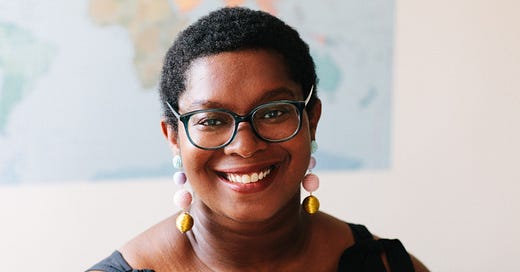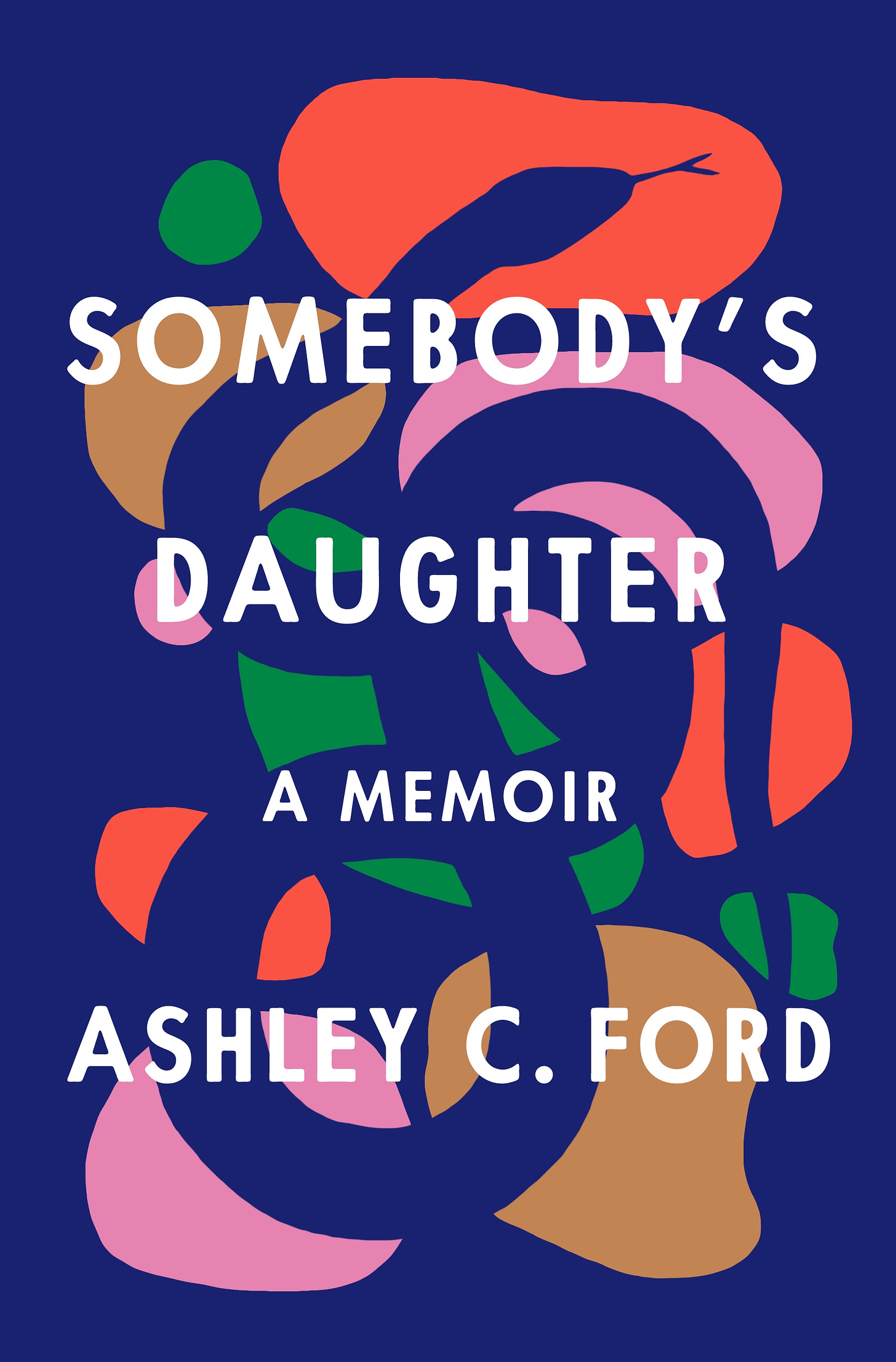Ashley C. Ford wrote her way to the truth
"Secrets are about shame and image control. Privacy is about what's sacred."
✨I’m ecstatic to share a very special new episode with all of you.✨
This year author Ashley C. Ford was interviewed about her New York Times bestselling memoir, Somebody’s Daughter, by people like Brené Brown, Terry Gross, Trevor Noah, and freaking Oprah! I’m overjoyed to share my own conversation with Ashley on the Cruel Summer Book Club podcast today.
Ashley’s memoir—which she worked on for a decade—delves deep into her childhood in Fort Wayne, Indiana. She grew up with a harsh mother who sometimes hit Ashley and her younger siblings, but who always did the best she could to support her family through enduring financial struggles. Her mother was left to raise Ashley and her brother alone when their father was incarcerated when Ashley was just a baby. Ashley didn’t learn of her father’s crimes—the rapes of two women—until she was a teenager, and though her father wrote her loving letters throughout her life, she didn’t visit him in prison until she was an adult herself.
The remarkably sharp memories of girlhood that Ashley shares are some of my favorite parts of the book. As someone who doesn’t have many youthful memories, Ashley’s detailed recall shocks me; she explains in our conversation that children who experience trauma at a young age often build strong memories as a survival tool. Ashley unfortunately did experience trauma as a young girl—she was raped by a classmate at the age of 13. She discusses how talking to her father about his crimes helped her finally accept that she didn’t deserve to feel any blame or shame for what had happened to her, nor did the people who chose to harm her deserve her protection.
Ashley directly credits therapy for allowing her to finally finish this book. In our conversation, Ashley and I discuss how she found the strength to write her way to the truth about her family; how to teach kids consent and agency from an early age; and how to stand up for your own experience of the world.
Below, read Ashley C. Ford talk about the difference between secrets and privacy, and how asking her father about his crimes helped her leave shame behind.
Please don’t forget to:
✨ Subscribe to the podcast on Spotify, Apple Podcasts, or wherever you listen. A new episode comes out every Thursday!
✨ Leave me a five-star review on Apple Podcasts. This really helps new listeners find and subscribe to the podcast.
✨ Share the podcast everywhere!
Jillian Anthony [JA]: I heard you say something on another podcast—something that I wrote down right away—about shame. You said, “There's a difference between secrets and privacy. Secrets are about shame and image control. Privacy is about what's sacred.” I found that to be so interesting and insightful. And I am wondering how you figure that out for yourself as a writer and as you were writing this memoir.
Ashley C. Ford [AF]: I think it was a lot of reading. And it was therapy. I went away to a program that I call trauma camp for a week, when I was right at the end of trying to get this book done. And one of the things I learned there was that I I deeply, deeply believed that it was my job, my duty, to hide certain things about my reality, or hide certain things that I had experienced, because sharing them might hurt the people who had harmed me. Or it might make people think of them differently, or they just might not like the fact that I had shared this thing, and then I would have to deal with that.
And I ended up figuring out that not only did I need to trust myself about my experience, but I also needed to own my experience, which meant that nobody else got to dictate the parameters around what I could and could not share that I experienced. That was not going to happen. That was secrets. That was shame. That was me carrying somebody else's baggage. Not because I wanted to, and not because it was helpful to them, but because they just felt like that was the right thing for me to do with no other evidence to build that case.
JA: And they're putting their experience in front of your own experience, too.
AF: It's not even in front of, it's above. It's more important that their current experience of the world is as seamless as possible, while I suffer in the reality of my pain, because I can't fully process my pain. Because to fully process my pain, I would have to express some form of it. And I'm not allowed to do that because that expression may or may not expose you, in particular. So while you get the seamless existence of people seeing you a certain way and thinking of you a certain way, of maintaining your image, I live with the suffering of your reality, of your real choices. And yeah, I'm not doing that. I don't owe anybody that. Nobody does.
JA: Absolutely not. It's amazing to hear you say that because there's so many people listening that really need to hear that message right now—to bring yourself back, put yourself first again, and don't silence yourself because somebody else made a mistake or hurt you or made a choice.
AF: Right. One of the things that helped me understand that was that when I talked to my dad about his incarceration, his crime—when I asked him, “How could you do it? What was it that made you think, ‘It's okay for me to do this’?” And one of the things he said to me in his response was, “I want to be very clear that I made choices. Victims don't make choices. They didn't do anything wrong, they didn't wear anything, they didn't say anything, they weren't in the wrong place at the wrong time. They were the victim of someone who decided to do something wrong,” he said, “and I was one of the people who decided to do something wrong. I made a choice.”
And when he said that to me, it suddenly occurred to me that all that anger and sadness I had about having been harmed by different people, and all of the ways that I found to blame myself for that were suddenly moot. Because I could not escape the fact that these people made choices. I couldn't rationalize my way away from that fact. These people made choices and those choices harmed me, and that is reality. As much as I want it to be different, as much as I want to see it differently, I want more of it to be in my control—it's just not reality. I have to accept that.
JA: I wrote a piece for the newsletter awhile ago about letting go of the question "Why?" which is so much more simply said than done, because we so deeply search for reason when really devastating things happen in our lives, or we lose people we love. But there is no why a lot of times.
AF: Sometimes there isn't, and you have to be able to accept that. One of the things that I tell people all the time is, one of the most damaging parts of my upbringing was the fact that there technically just weren't mistakes in my house. If you did something, “bad” or “wrong,” you did it on purpose. Even something as innocuous as spilling a jug of milk—grabbing it from the refrigerator, it slipping from your grip, maybe you just didn't expect it to be that heavy, the milk spills—you didn't make a mistake, you were careless. You weren't intentional enough, and that's why this happened.
That thing that we look for that everything has to have a why is also the reason why everything has to have someone to blame. It's why you get defensive when something goes wrong, because your first thought isn't “How do we fix the problem?” Your first thought is, “How do I make sure I don't get blamed for this problem?” Because when things go wrong, a lot of our society and culture has no tolerance for the fact that things just go wrong. Somebody has to be blamed. It has to be someone's fault, because there has to be an answer to my “Why?” And we're not comfortable with the fact that sometimes things just happen.
JA: Yeah. And our hearts are the ones that have the hardest time understanding those things. I've certainly been there, but it does help me sometimes when I'm going through hard times to think about—there doesn't have to be a reason right now, just let me feel this in my body. Let me not spin this off into a story, and let me experience that feeling and then try to let that go, rather than rationalize the hell out of every single thing that happens to me, which I still struggle with a lot.
AF: I do too. I talk a big game. I know these things in my thinking-self, but my feeling-self always needs time to catch up.
Further resources from Ashley C. Ford:
Order Somebody’s Daughter
Substack newsletter, Somebody’s Notes
Extra special thanks to the team who helped bring the CSBC podcast to life:
My producer, Dave Kushner (Instagram, Twitter), co-host of the Wrestling with Friends podcast
My editor, Shawn DePasquale (Instagram, Twitter), co-host of The Nanny Podcast
Logo artist Jaymie de los Reyes
Thanks for reading and listening to Cruel Summer Book Club! If you value CSBC, please consider showing your support on Venmo @jillathrilla, or through PayPal.
Thank you so much to readers Alla, Amelia, Andi, Annabel, Anne Marie, Ann-Kathrin, Brenna, Brittany, Brittany, Bryce, Cara, Catherine, Christine, Courtney, Danielle, Edith, Emily, Erin, Esme, Grace, Hannah, Jacki, Julia, Kate, Katie, Katie, Mallory, Maria, Melanie, Molly, Naureen, Rachel, Rahul, Riddhi, Rocky, Samantha, Sarah, Sasha, Scarlett and Stella for your support!
You are not alone!






Awesome blossom, Jillian, quite stoked to see the podcast growing with such powerful guests.